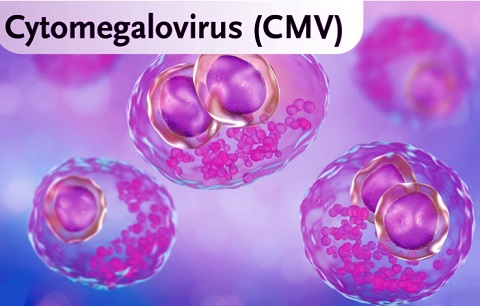Nikhil Prasad Fact checked by:Thailand Medical News Team Nov 08, 2024 11 months, 3 weeks, 8 hours, 44 minutes ago
Medical News: The COVID-19 pandemic has brought to light various complications that can arise from the infection. Among these complications, the reactivation of latent infections, such as cytomegalovirus (CMV), has become an emerging concern. CMV is typically dormant in the body but can reactivate in individuals with weakened immune systems. When it does, it can result in severe complications, particularly in those already battling a COVID-19 infection.
 COVID-19 and the Hidden Threat of Cytomegalovirus (CMV) Reactivation
What the Study Explored
COVID-19 and the Hidden Threat of Cytomegalovirus (CMV) Reactivation
What the Study Explored
Researchers Harshal Prakash Chorya from Medical College Baroda and Aastha Ketan Naik from Parul Institute of Medical Sciences and Research, both located in Vadodara, Gujarat, India, aimed to delve into the relationship between COVID-19 infection and the reactivation of CMV. They conducted a systematic review, analyzing 15 case reports and case series that detailed COVID-19 patients who also experienced CMV reactivation. This
Medical News report dives into the critical findings and implications of this review, exploring how COVID-19 may influence CMV reactivation, and what it means for patient care.
How the Study Was Conducted
The researchers followed PRISMA guidelines to systematically gather data on COVID-19 and CMV co-infections from three electronic databases: PubMed, ScienceDirect, and Google Scholar. After an initial screening of over 1,300 articles, they narrowed down their focus to 15 studies that met their specific criteria. These studies included cases from various countries, highlighting patients aged 42 to 92 who were admitted to hospitals with severe COVID-19 infections. The analysis also covered demographics, underlying conditions, treatment plans, and clinical outcomes for each case.
Key Findings on CMV Reactivation in COVID-19 Patients
One of the significant findings from this review was that patients with severe COVID-19 are at higher risk of CMV reactivation. The reactivation of CMV in these patients appears to be linked to immune system dysregulation - a situation where the immune response is compromised, making the body more vulnerable to latent infections. According to the review, CMV reactivation was common among patients with underlying chronic illnesses, especially those undergoing immunosuppressive treatments. Such treatments, often necessary to manage COVID-19 symptoms, inadvertently weakened the immune system further, creating conditions for CMV to reemerge.
High Mortality Rates Among Coinfected Patients
Among the 34 patients in the review, the clinical outcome was quite severe, with a mortality rate of 55%. Nineteen patients did not survive, and most of these individuals had at least one chronic health condition, such as diabetes, hypertension, or chronic kidney disease, in addition to the COVID-19 infection. The review pointed out that these underlying conditions significantly raised the risks of both severe COVID-19 complications and CMV reactivation.
Factors Contributing to CMV Rea
ctivation
The reactivation of CMV in COVID-19 patients may be driven by multiple factors, including age, chronic illness, and the use of immunosuppressive medications. The study highlighted that older adults, especially those with cardiovascular disease or diabetes, were more susceptible to CMV reactivation, which aligns with broader trends of increased vulnerability to infections in older adults. The suppression of immune cells, particularly T-cells and NK cells, in response to both COVID-19 and treatments like corticosteroids and tocilizumab, was identified as another key factor in CMV reactivation.
Gastrointestinal Issues and CMV
Another intriguing finding was that COVID-19 patients with CMV reactivation often experienced gastrointestinal symptoms. Both COVID-19 and CMV can impact the gastrointestinal tract, making it difficult for clinicians to distinguish between the two infections based on symptoms alone. The review emphasized that CMV reactivation could complicate gastrointestinal symptoms in COVID-19 patients, leading to more severe health challenges.
Treatment Approaches and Their Challenges
Most patients in the review received antiviral treatments like ganciclovir or valganciclovir to manage their CMV infections. These medications were generally effective in controlling CMV symptoms. However, the review pointed out that even with these treatments, the high mortality rate indicated that CMV reactivation remains a serious concern. The study suggests that earlier diagnosis and timely intervention may improve outcomes for COVID-19 patients at high risk of CMV reactivation.
Limitations and Need for Further Research
The authors acknowledged some limitations in their study. The small sample size, combined with the reliance on case reports and case series, may limit the generalizability of the findings. Additionally, the review did not assess the risk of bias, focusing instead on collating patient characteristics and clinical outcomes. Despite these limitations, the study provides valuable insights into the complex relationship between COVID-19 and CMV reactivation, highlighting the urgent need for more comprehensive research.
Conclusion: The Road Ahead in Managing Dual Viral Threats
The findings from this systematic review underscore the importance of vigilance in managing COVID-19 patients with preexisting conditions and those undergoing immunosuppressive treatments. CMV reactivation is a potential complication that can worsen clinical outcomes, particularly in older adults with chronic health issues. For healthcare providers, these findings emphasize the need for proactive monitoring of COVID-19 patients at risk of CMV reactivation. Developing protocols for early detection and treatment of CMV in high-risk COVID-19 patients could be a critical step in reducing mortality rates associated with dual viral infections. As researchers continue to explore the long-term impacts of COVID-19, understanding and mitigating the risks of latent infections like CMV will remain essential.
The study findings were published in the peer-reviewed journal Apollo Medicine.
https://journals.sagepub.com/doi/full/10.1177/09760016241290598
For the latest COVID-19 News, keep on logging to Thailand
Medical News.
Read Also:
https://www.thailandmedical.news/news/warning-sars-cov-2-infections-are-accelerating-t-cell-immunosenescence-and-increasing-cardiovascular-disease-risks-in-cmv-seropositive-individuals
https://www.thailandmedical.news/news/reactivation-of-herpesviruses-like-epstein-barr-virus-and-cytomegalovirus-could-be-causing-long-covid-issues
